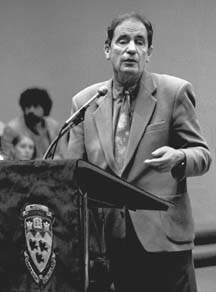
South African judge Albie Sachs
October 24, 1996
 South African judge Albie Sachs |
by Sylvain Comeau
Thirty years ago, Albie Sachs was targeted by South Africa's former apartheid regime as an enemy of the state. In fact, agents of the regime tried to have him killed. Today Sachs is one of his country's most influential judges. The former African National Congress activist recently reflected on his remarkable life's journey as he delivered the Faculty of Law's sixth Natan Sharansky Lecture on Human Rights.
Sachs recalled the long fight he and other activists waged against apartheid. "We hoped at the beginning (in the 1950s) that it could be done by non-violent means, and we used Gandhian techniques. But once the ANC and other organizations were banned in 1960, the whole thing changed, and we just knew that we were engaged in a confrontation with a ruthless state."
Sachs became an anti-apartheid leader, and in 1965, was detained under the South African International Security Act and held in solitary confinement for 180 days. He was exiled from South Africa upon his release. In 1988, while he was drafting a new Civil Code for the government of Mozambique, an assassin's bomb cost him his right arm, and nearly his life.
"I felt a mixture of dread and relief when the attempt to kill me came, and I survived. It was as though I had been waiting for it for 30 years. Every night I had gone to bed wondering if it was my last night. That is the experience of a generation, not just of myself."
In 1994, Sachs was appointed by South African president Nelson Mandela to the country's first Constitutional Court, which renders judgments on cases which touch on constitutional issues. The court is also responsible for drafting a new, final constitution for the country; it will examine a new draft in November.
Sachs views the court as a vital element in the country's transition from an autocratic state to a democracy under the rule of law.
"The constitution is supreme, and the court's interpretations of the constitution are binding on the president and on Parliament. Every-one accepts that."
The new, democratic South Africa is also a country with a surprising capacity for forgiveness. Despite enduring arbitrary arrest, exile, and an assassination attempt, Sachs is not troubled by the amnesty being offered to former state- sponsored criminals.
"How would it help me if they go to jail--it won't make my arm grow. I'm just glad that we have democracy, a constitutional court, and fundamental rights. Being part of that process fulfills me. It is wonderful now to be building and constructing and healing. So many of us spent our lives destroying an evil system. Today we are using a different side of us.
"It doesn't matter who was responsible, what their names are. The important thing is that we understand the structures that were responsible, reveal what happened, and establish the abnormality of it all, so that it never happens again."
South Africa has even managed to largely defuse the potentially explosive land claims issue. The Constitutional Court is hearing a number of such land claims cases, and Sachs explained how the country is steering around the issue's land mines.
"Land reform was expected to be the most explosive issue, and so far, it has not turned out that way. The constitution provides for the restoration of land to people who were dispossessed under racist statutes, and several thousand claims have been made already. But the strategy of the constitution and the government is not confiscation; it is purchase, what we call market- assisted land reform. Sometimes the state will buy out someone living on land belonging to someone else; often the state itself is the owner of the land which was taken from someone else. The state will give it back, or give other land or other forms of compensation."
Many of the holders of the disputed land are farmers, who are encouraged to participate in the process at no risk of being dispossessed themselves.
"The South African way, now, is consensus-seeking, attempting to balance and mediate. It takes a little longer, but the society holds together in the meantime."
Sachs and the other justices of the court were chosen not only for their legal acumen--each has a history of human rights activism and legal work on behalf of minority rights.
"That is not representative of the whole society--some might say that the court should have judges that defended the old order, to assemble a completely pluralistic bench. But that was rejected in favor of a proven commitment to human rights, in addition to legal skills."
Some of the justices, like Sachs, used to be at odds with the state; now, they make the law of the land. That is just one aspect of the new South Africa that many regard as a miracle. Sachs is not one of them.
"A miracle is something that goes against nature. People have struggled and laboured and hoped for this (change). They have put in huge amounts of energy, sacrifice, determination, thought, intelligence and, in the end, accommodation. So, to me, [South Africa's transformation] is the most unmiraculous event you can imagine."